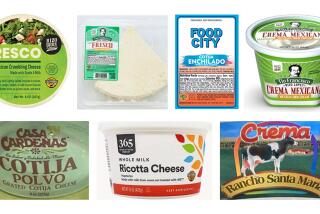Food Firm Pleads Guilty to Fraud
- Share via
SAN DIEGO — A San Diego food brokering firm and its president pleaded guilty Thursday to fraud in selling 1.7 million pounds of Mexican strawberries to the federal government’s nationwide school lunch program.
Some of the strawberries were linked last spring to an outbreak of hepatitis A among hundreds of students and teachers in Michigan, Maine and Wisconsin. As a precaution, several thousand students in Los Angeles who had eaten the strawberries received inoculations.
The firm, Andrew and Williamson Sales Co., agreed to pay $1.5 million to the federal government. Officials said the firm will be banned for several years from selling strawberries to the U.S. Department of Agriculture’s school lunch program. The length of the ban will be decided by USDA officials.
“In this area of food safety, the government has zero tolerance,” said Assistant U.S. Atty. Philip Halpern.
Because of the limits of scientific evidence, the government did not charge the company with knowing that the strawberries were spoiled. It may never be known if the strawberries spoiled during harvesting, packaging or shipping, the government said.
The firm and its president, Frederick L. Williamson, admitted they knew that the strawberries were grown in Mexico but had told USDA officials that the strawberries complied with a law that commodities sold to the lunch program be “100% grown and processed” in the United States. One goal of the school lunch program is to act as a price support for U.S. growers.
Under a plea bargain, Williamson, 60, of Oceanside, agreed to a prison sentence of 10 to 16 months and a possible fine of $750,000, to be determined by a judge at a sentencing hearing in February. A company salesman, Richard H. Kershaw, pleaded guilty in May and also awaits sentencing.
*
The company is responsible for the removal and disposal of 916,380 pounds of unconsumed frozen strawberries in 17 states. For the 1.7 million pounds, the company had been paid $902,000 by the USDA, which spends more than $400 million a year on the school lunch program.
When the hepatitis A outbreak occurred, a quarantine was immediately imposed on strawberries grown in California and Mexico. California growers lost $15 million, or 3% of the state’s annual crop.
In a written statement, Williamson’s son, Fred Jr., now acting as the firm’s president, said: “We are glad to get this matter behind us so we may devote our full time and attention to servicing the fresh produce community. Our differences with the government focused on a single transaction in a minor, and now discontinued, segment of our business.”
The hepatitis cases were traced to 240 cases of frozen strawberries delivered in four-ounce plastic dessert cups. Although rarely fatal, hepatitis A can produce severe flu-like symptoms.
The case caused a controversy in Mexico, where some growers said the United States was trying to undercut the Mexican strawberry market by spreading “scare” stories.
U.S. Atty. Alan Bersin said the Mexican government cooperated with USDA and Food and Drug Administration inspectors who visited the Mexican strawberry fields in Baja California and the processing plant in San Diego to see if the source of the contamination could be pinpointed.
But officials were unable to determine what the conditions in the fields and plant were in the spring of 1996 when the berries were picked and processed. “Most of the employees who picked and processed the strawberries a year ago have dispersed and are not available for interviews,” Bersin said.
More to Read
Inside the business of entertainment
The Wide Shot brings you news, analysis and insights on everything from streaming wars to production — and what it all means for the future.
You may occasionally receive promotional content from the Los Angeles Times.










